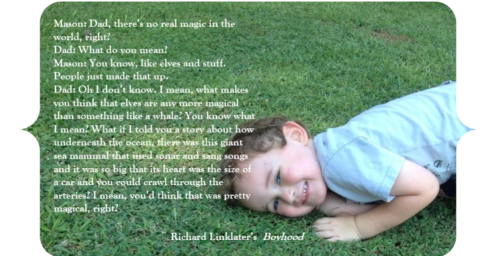by Miss December 2015 – Kayla I Shown-Dean
I don’t know how many of you have seen Richard Linklater’s movie Boyhood, but this quote is one of my absolute favorites, and it’s so true for writers.

Often, when writing, we are seeking escapes from our own world. For example, we may feel compelled to write a memoir about the first day of college as a first generation college student. However, we talk ourselves out of it, thinking that our stories are too dull or boring. So we decide to change things up. Instead, we may change our character to an Arcturian alien who crash-landed on Earth and must disguise herself as an underprivileged college student in order to learn the ways of our world. Often, we make changes such as these simply to just “spice things up”—or, for the more literary types, to symbolize and magnify the level of confusion and/or isolation felt by first generation female college students.
Now, this isn’t a dig at the fantasy genre or the literary world,—I actually enjoy a good fantasy read from time to time—and really, both stories, with some development, would be entertaining. However, to change a story simply because you don’t feel it’s exciting enough does the literary world a great injustice. There are probably several people out there who could relate to Story A (the first generation college student), and it’s this connection that all authors should aim to achieve with their readers.
Unfortunately, what I see a lot of with my students is something in between. Instead of keeping the original character in Story A—they will alter her a bit. Maybe make her a single mom going back to school after a tough divorce, or perhaps her part-time job is moonlighting as a stripper to pay for tuition. While I realize that these situations are sometimes true-to-life, the danger here is falling into clichés and stereotypes—or what I like to call hooker-with-a-heart-of-gold syndrome.
This goes against the number one rule I’ve been taught as a writer: write what you know. This doesn’t mean that I’m prohibited from accessing foreign or intergalactic worlds and characters; neither does it mean that I’m limited to telling my own story. It means that I should use my own personal knowledge and experience with others and society to build my alternate world. It means that my personal stories are not invalid. On the contrary, they are worth sharing, and it is from these personal experiences that I will draw inspiration to develop well-rounded characters for my stories.
For example, I included this character, Tex, very briefly in my last novel, Muted; what my readers don’t realize is that he is loosely based off my alcoholic grandfather. But it’s exactly my experience with my grandfather that authenticates this character.

You see, just like Mason (Ellar Coltrane) in Boyhood, we, as writers, often believe that our stories are boring—that they are void of excitement, adventure, and magic. But they aren’t. The entire human experience is writhing with magic. It’s just up to us as writers to unearth it—to describe the ordinary in such a way that it becomes the extraordinary. The old adage “beauty is in the eye of the beholder” reigns true. Especially in writing. It’s all about perspective, and if we as writers can’t find the beauty and the magic in our world, how can we expect others to do so?
Today’s writing assignment:
Write about something that you find completely boring and ordinary, but describe it in a way that makes it seem magical. Afterwards, share your description on social media using #magicalstory in your post, or simply include your description in the comments.
